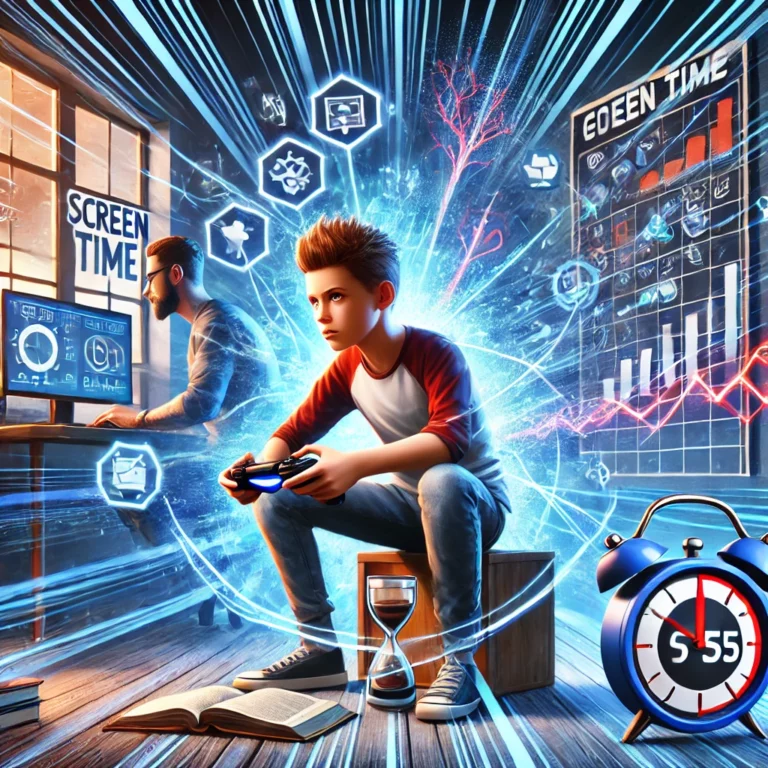Introduction
The debate over the impact of video games on children’s mental health, particularly regarding Attention Deficit Hyperactivity Disorder (ADHD), is ongoing. Video games do not cause ADHD, but they can be appealing to kids with attention problems. Understanding the dynamics between video gaming and ADHD can help parents, educators, and mental health professionals better support children with attention disorders.
This blog post explores the relationship between video games and ADHD, emphasizing the importance of balance and moderation. We will delve into the reasons why kids with ADHD are drawn to video games, the potential risks of excessive gaming, and expert recommendations on managing screen time. By examining scientific studies and expert opinions, we aim to provide a comprehensive overview of this complex issue.
Why Video Games Appeal to Kids with ADHD
Constant Stimulation and Instant Rewards
Kids with ADHD can focus well on video games due to constant stimulation and instant rewards. Unlike traditional learning environments that may struggle to capture their attention, video games provide a high level of engagement through rapid feedback and dynamic visuals. The immediate gratification from achieving goals in games can be particularly appealing to children who may find it challenging to stay motivated in other activities.
The Child Mind Institute suggests that the nature of video games, with their structured yet stimulating environments, can help children with ADHD maintain focus and concentration. This is in contrast to tasks that require prolonged attention and delayed rewards, which are often more difficult for these children to navigate.
Short Bursts of Attention
Video games require short bursts of attention, making them easier for kids with ADHD to focus on. The typical gameplay structure involves completing small, discrete tasks, which aligns well with the attention spans of children with ADHD. This ability to focus intensely for short periods can give the impression that video games are a suitable activity for these children.
However, it is crucial to recognize that while video games can engage children with ADHD effectively, this does not translate to improvements in attention span outside of the gaming context. The skills developed in video gaming do not necessarily carry over to other areas requiring sustained attention and focus.
Potential Risks of Excessive Gaming
Displacement of Other Activities
Spending too much time playing video games can be harmful, not because they cause ADHD, but because it takes away time from other activities. Engaging in video games for extended periods can lead to a sedentary lifestyle, reduced physical activity, and missed opportunities for social interactions and academic pursuits. These factors can contribute to a range of negative outcomes, including poor physical health and social isolation.
According to the American Academy of Pediatrics, children should have a balanced schedule that includes physical activities, social interactions, and academic responsibilities alongside screen time. Limiting gaming time ensures that children do not neglect other essential aspects of their development.
Impact on Social Skills
Kids spending excessive time playing video games miss out on valuable social interactions and development. Interacting with peers, family members, and engaging in face-to-face communication are critical for developing social skills. When children prioritize gaming over social activities, they may struggle with forming and maintaining relationships in real life.
Natalie Weder, a child and adolescent psychiatrist, emphasizes that while video games can offer a form of social interaction through online multiplayer modes, these interactions are not a substitute for real-world social experiences. Children need to develop the ability to read social cues, engage in conversations, and build empathy, skills that are best learned through direct human interaction.
Expert Recommendations on Screen Time
Guidelines from the American Academy of Pediatrics
The American Academy of Pediatrics recommends limited screen time for children to promote healthy development. For children aged 2 to 5, screen time should be limited to one hour per day of high-quality programming. For older children, consistent limits should be set to ensure that screen time does not interfere with sleep, physical activity, and other behaviors essential to health.
Caroline Miller, a senior writer at the Child Mind Institute, highlights that these guidelines are not only about limiting time but also about ensuring that the content consumed is beneficial and age-appropriate. Parents are encouraged to engage with their children during screen time to help them understand and apply what they see on the screen.
Balancing Screen Time and Other Activities
There is no evidence that video games cause ADHD, but they can be addictive for some children. Ensuring a balanced approach to screen time involves setting clear boundaries and encouraging a variety of activities. Parents should monitor their children’s gaming habits and promote a healthy mix of physical, social, and intellectual activities.
Dr. Natalie Weder suggests creating a family media plan that includes rules about when and where screens can be used, types of permissible content, and designated screen-free times, such as during meals and before bedtime. This approach helps children develop a healthy relationship with technology and prevents the overuse of video games.
Scientific Insights and Studies
Fast-Paced Games and Attention
Fast-paced games can keep the attention of kids with ADHD, as something is always happening on the screen. These games often require quick reflexes and constant attention, which can make them particularly engaging for children with attention disorders. However, this constant stimulation may not translate to other areas of life where sustained attention is required.
Studies have shown that while video games can improve certain cognitive skills, such as hand-eye coordination and spatial awareness, they do not necessarily enhance overall attention spans or academic performance. It is essential to understand that the skills acquired in gaming are context-specific and may not be applicable to other domains.
Ethical Considerations in Gaming and ADHD
Video games do not worsen ADHD symptoms, but kids who play the most may have more severe symptoms. It is important to differentiate correlation from causation; children with more severe ADHD symptoms may be more drawn to video games as a form of escapism or self-soothing. This relationship underscores the need for careful monitoring and moderation of gaming habits.
Ethical considerations also come into play when addressing the potential for video game addiction. Games are designed to be engaging and rewarding, which can lead to excessive use. Parents and educators must be vigilant in recognizing signs of addiction and take proactive steps to address them, such as seeking professional help if necessary.
Conclusion
Video games and ADHD have a complex relationship that requires careful consideration and balance. While video games do not cause ADHD, they can be particularly appealing to children with attention problems due to their constant stimulation and instant rewards. It is crucial to ensure that gaming does not displace other essential activities and that children maintain a balanced schedule that promotes overall development.
By following expert recommendations, such as those from the American Academy of Pediatrics, and setting clear boundaries around screen time, parents can help their children enjoy the benefits of video games without the associated risks. Understanding the ethical considerations and potential for addiction is also key to fostering a healthy relationship with technology.
In summary, video games can be a valuable tool for engaging children with ADHD when used appropriately. However, it is essential to ensure that they do not become a substitute for real-world interactions and activities that are crucial for healthy development.



